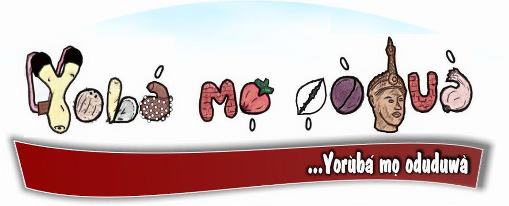In Yorùbá land, ilé l’à ń wò kí á tó sọ ọmọ l’órúkọ.
This implies that, the various
circumstances surrounding the birth of a child is a major factor in naming the
child on the ọjọ́ ìsọmọlórúkọ.
Maybe, it took long for the child to
come out of the mother, the labour which the mother had to go through and etc
can be the reason behind the child’s name (àsìkò tí a bí mi yàtọ̀, ìdílé tí a ti bí mi yàtọ̀, ọjọ́ àti ọdún pàápàá yàtọ̀ síra wọn).
We all are not born the same day, month, and year and also we are not born the same way, we came from different family as well as sociopolitical background.
We all are not born the same day, month, and year and also we are not born the same way, we came from different family as well as sociopolitical background.
Bákan náà, ni ọ̀nà tí a gbà bími yàtọ̀ sí ọ̀nà tí a gbà bí ìrẹ. Bí a ṣe bí àwọn kan tí wọ́n dojú sókè kọ́ la bí àwọn míràn tí wọ́n sojú dẹ́lẹ̀ nígbà tí a bí wọn - Also, we were born in different ways, the same way i was born is not the same
way you were born, while many came out from the mother with the head facing up,
others come out with the head face down.
A child born with locked hair; dreadlocks is regarded as Dàda.
Automatically, any child born in the Yoruba house born face down will be named Àjàyí.
Tàlàbí; this is a name of a child who has covering around the face at birth.
A child born with locked hair; dreadlocks is regarded as Dàda.
Automatically, any child born in the Yoruba house born face down will be named Àjàyí.
Tàlàbí; this is a name of a child who has covering around the face at birth.
On the other hand, if the child is born
with the umbilical cord around the neck, such children are referred to as Àìná for a girl and Òjó for a male child. Whereas, a child that comes out with the legs is the Ìgè, or Ìgè-Àdùbí
Furthermore, if a child stayed in the
womb beyond the usual 9 and
10 months, the child name will include Ọmọ́pẹ́ (child stayed long in womb).
Another unique set of people according to the Yoruba culture are twin children; ìbejì or ọmọ méjì. The first to come out of the mother among the two children is the Táiyé /Táíwò (tọ áyé wò – have a taste of life) and the second is the Kẹ́hindé/Àkẹ́hindé/ ọmọkẹ́hindé (one who came late). Ọmọ-kẹ́hin-dé, the second of the twins is regarded to be the senior who sent ọmọ- tọ - áyé- wò to come see how sweet earth is, táíwò is the àbúrò (junior).
Those born after the twins are the Ìdòwú and Àlábà respectively.
Apart from giving
birth to ọmọ meji, Yorubas also have the ìbẹ́ta/ ọmọmẹ́ta/ẹ̀ta òkò
(triplet) , ìbejì are believed to be special children, adored by the Yorùbá
race.
Away from the ìbejì and ìbẹta. Some children are born
with more than five fingers or toes, such people are called olúgbodi.
Furthermore, traditional Yoruba names are not only by the
circumstances surrounding the birth of a child that points to a befitting name
for the child, but also the behaviour of the child after birth prior to the ọjọ́ isọmọlórúkọ
(child naming day).
A child that cries all time is the Òní, whereas a child born and enveloped in a sack of flesh will have Ọkẹ́ as a name. Some women take-in without a menstrual circle, children conceived by women like this, are named ìlọ̀rí.
A child that cries all time is the Òní, whereas a child born and enveloped in a sack of flesh will have Ọkẹ́ as a name. Some women take-in without a menstrual circle, children conceived by women like this, are named ìlọ̀rí.
Above all, the
situation at hand when the baby was delivered also gives insight to a choice of name for the child. A child born during any
festivity have names like Abíọ́dún, Bọdúnrin and Bọdúndé. In a
sad moment, names like Rẹ̀mílẹ́kún, Ẹkúndayọ̀ are names suitable for the new child. On the opposite,
children born in happy times have the prefix
or suffix- Ayọ̀ in their names.
What about the
names of the Àbíkú? Do you know any? Of course, the wandering children also
have their own names which tells one upon hearing such names that the child is
an Àbíkú.
Children born
during the raining season are called Béjidé. Beautiful babies have names
like Béwaji,
Ẹwátòkẹ́, Ewáwùmi. Women who gives
birth on the road have their child named Abíọ́nà (born on the road). When the father/mother travels and he/she
came back to meet a new born baby, such child will be named Tòkunbọ̀; ti-òkun-bọ̀ (arrival from sea). Ọmọtóóyọ̀sí is a name given to child whom the mother and father had longed for, the
name means the joy of having a child.
When a man lost his
father and the wife put to bed shortly after the death of her father-in-law,
no one tells the man that the child’s name will be Babátúndé tabi Babájídé
and Yétúndé or ìyábọ̀ if it was a girl,
most especially if the baby look just like the late grandfather or grandmother.
Now you can see
that there is a lot in a Yorùbá name. Names that are unique, names that are different.
What is your Yorùbá name? Do you know the meaning?
Have you ever made an attempt to find out what your name means?
Have you ever made an attempt to find out what your name means?
Come here again for the sequel!!!
Ẹ ṣé gan-an ni
Check out > www.yobamoodua.org for more on Yorùbá education and information.
Ẹ ṣé gan-an ni
Check out > www.yobamoodua.org for more on Yorùbá education and information.

